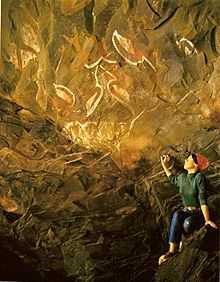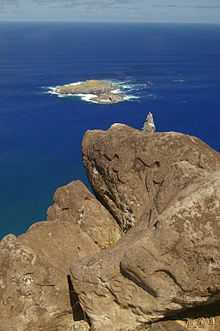Tangata manu
The Tangata manu (bird-man) was the winner of a traditional competition on Rapa Nui (Easter Island). The ritual was an annual competition to collect the first Sooty Tern (manu tara) egg of the season from the islet of Motu Nui, swim back to Rapa Nui and climb the sea cliff of Rano Kau to the clifftop village of Orongo.

Myth
In the Rapa Nui mythology, the deity Make-make was the chief god of the birdman cult, the other three gods associated with it being Hawa-tuu-take-take (the Chief of the eggs) his wife Vie Hoa and Vie Kanatea.
Birdman religion
Contestants were revealed in dreams by ivi-attuas, or prophets. The contestants would each appoint a Hopu who would swim to Motu Nui and fetch them the Egg, whilst the contestants waited at Orongo. The race was very dangerous and many Hopu were killed by sharks, drowning or falling.[1]
Once the first egg was collected, the final task would be for the unsuccessful contestants to return to Orongo, the winner allowed to remain in Motu Nui until he felt spiritually prepared to return. On his return he would present the egg to his patron, who had already shaved his head and painted it either white or red. The successful man would be declared Tangata-Manu, would take the egg in his hand and lead a procession down the slope of Rano Kau to Anakena if he was from the western clans or Rano Raraku if he was from the eastern clans. Once in residence there he was considered tapu (sacred) for the next five months of his year-long status, and allowed his nails to grow and wore a headdress of human hair. The new Tangata-Manu was given a new name, entitled to gifts of food and other tributes (including his clan having sole rights to collect that season's harvest of wild bird eggs and fledglings from Motu Nui), and went into seclusion for a year in a special ceremonial house.[2]
The Birdman cult was suppressed by Christian missionaries in the 1860s. The origin of the cult and the time thereof are uncertain, as it is unknown whether the cult replaced the preceding Moai-based religion or had co-existed with it. Katherine Routledge was, however, able to collect the names of 86 Tangata manu.[1]
In Popular Culture
- The band Rasputina's song Oh Bring Back the Egg Unbroken on their 2007 album, Oh Perilous World, is about these traditions.
- The Hollywood film Rapa Nui has a version of the race, though in the wrong historic context.
References
- ↑ 1.0 1.1 The Mystery of Easter Island 1919 - Katherine Routledge ISBN 0-932813-48-8
- ↑ El Ritual del Hombre-Pajaro – the bird-man cult of Rapa Nui by Bob Gosford
| ||||||||||||||||


